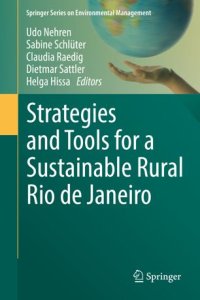
Ebook: Strategies and Tools for a Sustainable Rural Rio de Janeiro
- Tags: Environment, Environmental Management, Sustainable Development, Environmental Geography
- Series: Springer Series on Environmental Management
- Year: 2019
- Publisher: Springer International Publishing
- Edition: 1st ed.
- Language: English
- pdf
This book is a compilation of recent developments in land, ecosystem, and water management in the Brazilian state of Rio de Janeiro. The state is located in the biodiversity hotspot of the Atlantic Forest (Mata Atlântica), a biome characterized by high biological diversity and endemism. At the same time the state of Rio de Janeiro emerged to one of the economic hubs in Latin America. This development process has been accompanied by population growth, industrialization, urbanization, as well as consumption and degradation of land and water resources. In the past years many efforts have been made to stop or at least slow down these degradation processes and restore degraded environments with the overall goal to bring together sustainable management of natural resources, nature conservation, and economic development.
An overview is provided of the different strategies and tools that have been developed in the fields of agriculture, ecosystem management and biodiversity, integrated water management, land restoration, disaster risk reduction and climate change adaptation, as well as environmental governance and economic instruments. This book covers a wide spectrum from applied research to science‐policy interfaces, planning concepts, and technical tools and has a model character for other rural areas in Latin America. Target groups are scientists, practitioners, policy makers and graduate students in the field of environmental management. The different chapters are written by researchers and practitioners of the German‐Brazilian project INTECRAL (Integrated Eco Technologies and Services for a Sustainable Rural Rio de Janeiro), the rural development program Rio Rural under the state secretary for agriculture and animal husbandry, as well as invited scientists from Brazilian universities and research institutes. It bridges existing gaps between science, policies, and practice in rural development.